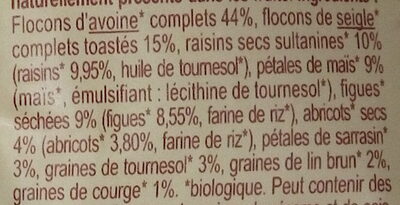Muesli fruits - Carrefour BIO - 375 g
This product page is not complete. You can help to complete it by editing it and adding more data from the photos we have, or by taking more photos using the app for Android or iPhone/iPad. Thank you!
×
Some of the data for this product has been provided directly by the manufacturer Carrefour España.
Barra-kodea: 3560071407506 (EAN / EAN-13)
Izen arrunta: Mélange de flocons de céréales et de fruits secs, sans sucres ajoutés, riche en fibres et issu de l'agriculture biologique
Kopurua: 375 g
Markak: Carrefour BIO, Carrefour
Kategoriak: en:Plant-based foods and beverages, en:Plant-based foods, en:Breakfasts, en:Cereals and potatoes, en:Cereals and their products, en:Breakfast cereals, en:Cereals with fruits, Muesli, en:Bircher-style mueslis, en:Mueslis with fruits, en:Bircher-style mueslis with fruits
Etiketak, ziurtagiriak, sariak:
en:Organic, en:Certified by Ecocert, en:EU Organic, en:Non-EU Agriculture, en:EU Agriculture, en:EU/non-EU Agriculture, FR-BIO-01, en:Green Dot, No added sugar, Nutriscore, Nutriscore A, AB Agriculture Biologique, Triman, fr:Avec des céréales complètes



Origin of ingredients: en:European Union and Non European Union
Link to the product page on the official site of the producer: https://www.carrefour.fr/p/muesli-fruits...
Dendak: Carrefour
Matching with your preferences
Report a problem
Datuen iturria
Product added on by kiliweb
Last edit of product page on by thaialagata.
Produktuaren orria -gatik editatua abdo78, alexfauquette, annelotte, chevalstar, elcoco, org-carrefour-espana, quechoisir, roboto-app, scanbot, segundo, teolemon, yuka.sY2b0xO6T85zoF3NwEKvlhZAC_j982rrDxPlpx239O-1HJ_iSPRvzK_CLas, yuka.sY2b0xO6T85zoF3NwEKvlmIcb_nw8y_fLT7tuRDU9M6SN4TlavFOuIL2Fas.















